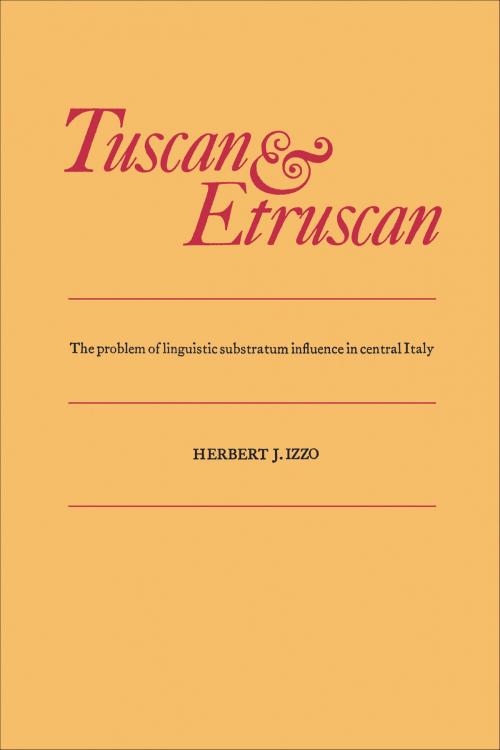Tuscan and Etruscan
The problem of linguistic substratum influence in central Italy
Fiction & Literature, Literary Theory & Criticism, Ancient & Classical, Nonfiction, Reference & Language, Language Arts, Social & Cultural Studies, Social Science| Author: | Herbert Izzo | ISBN: | 9781487590475 |
| Publisher: | University of Toronto Press, Scholarly Publishing Division | Publication: | December 15, 1972 |
| Imprint: | Language: | English |
| Author: | Herbert Izzo |
| ISBN: | 9781487590475 |
| Publisher: | University of Toronto Press, Scholarly Publishing Division |
| Publication: | December 15, 1972 |
| Imprint: | |
| Language: | English |
The Italian spoken in most of Tuscany is characterized by a number of peculiar pronunciations which for over half a century Romance scholars have explained by a theory of linguistic substratum influence. This theory postulates that present-day Tuscan pronunciation is a survival of the 'foreign accent' with which the ancient Etruscans must have spoken Latin when Rome first began to extend its power and language over the rest of Italy.
Professor Izzo has undertaken a new and thorough investigation of modern Tuscan pronunciation, disproving this hypothesis and providing a definitive conclusion to the debate. He delineates clearly the errors in reasoning of those who trace the Tuscan pronunciation to an Etruscan influence, and presents his conclusions objectively.
This study will interest Romance linguists, especially historians of the Italian language; but it will also interest historical linguists in general, for by disproving one of the most plausible and best-documented cases of alleged substratum influence, it casts doubt on many other cases where such influence has been claimed with little evidence.
The Italian spoken in most of Tuscany is characterized by a number of peculiar pronunciations which for over half a century Romance scholars have explained by a theory of linguistic substratum influence. This theory postulates that present-day Tuscan pronunciation is a survival of the 'foreign accent' with which the ancient Etruscans must have spoken Latin when Rome first began to extend its power and language over the rest of Italy.
Professor Izzo has undertaken a new and thorough investigation of modern Tuscan pronunciation, disproving this hypothesis and providing a definitive conclusion to the debate. He delineates clearly the errors in reasoning of those who trace the Tuscan pronunciation to an Etruscan influence, and presents his conclusions objectively.
This study will interest Romance linguists, especially historians of the Italian language; but it will also interest historical linguists in general, for by disproving one of the most plausible and best-documented cases of alleged substratum influence, it casts doubt on many other cases where such influence has been claimed with little evidence.















